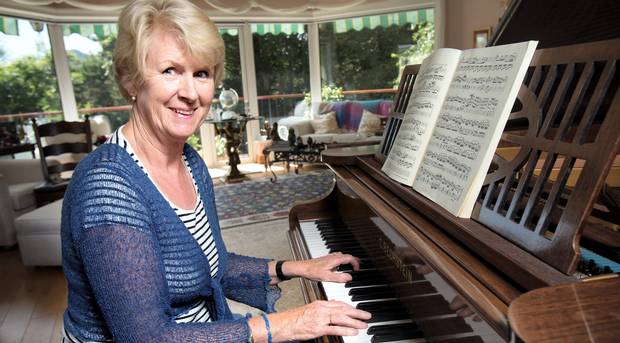Earlier this month the National Concert Hall was the venue for a significant celebration – the 80th birthday of treasured pianist Veronica McSwiney. The occasion, promoted by Dublin International Piano Competition, found her in spectacular form, playing with her usual aplomb and communicating with her audience through the mastery of her musicianship.
The evening was primarily a gathering of family, friends and admirers including violinist daughter Aisling O’Dea and violist niece Carla Vedres. Cellist Violetta-Valerie Muth, soprano Virginia Kerr, clarinettist John Finucane, pianist John O’Conor and host Olivia O’Leary were the on-stage friends. There were relations and acquaintances among the audience but the majority were devotees wishing to enjoy Ronnie’s remarkable pianism. They were not short-changed.
In the convivial atmosphere, Ronnie’s articulate playing, and stunning appearance, defied the passing of time.
Spellbinding
Born in Dublin, Veronica McSwiney studied at the Municipal School of Music under Dr JJ O’Reilly. But before that, at the age of six, her mother had taken her to hear the exceptional Polish-born pianist Artur Rubinstein. The effect on Ronnie was spellbinding with Rubinstein becoming her hero. By the age of ten she made her first Radio Éireann broadcast in its Children at the Microphone programme.
With numerous Feis Ceoil awards to her credit, Ronnie made her first concerto appearance with the RÉSO at 14 and her Dublin recital debut when she was 16. After this she came to the notice of English entrepreneur Sir Robert Mayer and his wife Lady Dorothy. They assisted her studies at the Salzburg Mozarteum and with the eminent Hungarian pianist Ilona Kabos in London. After her Wigmore Hall debut Ronnie established herself on the international music circuit.
With her recording of the John Field Nocturnes, she became the first Irish pianist to be invited to undertake an extensive recital tour of the Soviet Union. Three others followed with Ronnie playing with many of the USSR’s leading orchestras. Tours of the US and Europe were also par for the course and for several years Ronnie acted as music director of Irish National Opera playing its Mayer-gifted upright Steinway piano throughout the country.
Following the death of her first husband and rearing her family, Ronnie joined the Classical Music Cruises organisation, where she met her second husband, who passed away relatively recently. The death of her beloved daughter, Judy O’Dea, some years previously had a profound effect on Ronnie and diverted her from music altogether for some time. She admits hearing Chopin played by Rubinstein brought her ‘back on course’.
In latter years Ronnie has been invited to sit on many international piano competition juries. She also adjudicates at musical festivals at home and abroad and finds the wealth of talent in our own country refreshing.
The NCH’s birthday programme presented Ronnie in several pianistic guises with Mozart’s G minor Piano Quartet as ensemble player; Schubert, Larchet and John McCabe as accompanist; Bizet, Arensky and Shostakovich as duettist on one and two pianos.
For me, her piece de résistance was her solo – Chopin’s C sharp minor Op 21/1 Nocturne. It was hauntingly expressive. Ad multos annos.


 Veronica McSwiney
Photo: Independent.ie/Tony Gavin
Veronica McSwiney
Photo: Independent.ie/Tony Gavin 